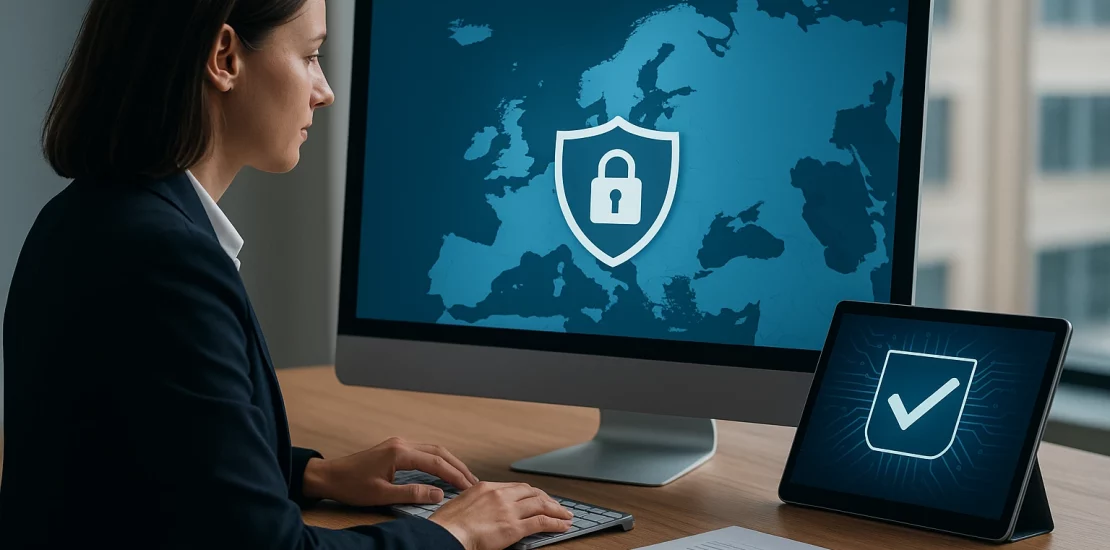What is the NIS2 Directive and How Will It Impact UK Businesses?
- October 28, 2025
- Posted by: Gradeon
- Category: Cyber Security

As cyber threats evolve and become more sophisticated, regulators around the world are raising the bar on digital security. One such regulation, the NIS2 Directive (Network and Information Systems Directive 2), is reshaping how organisations across Europe manage cybersecurity, risk, and resilience.
While the UK is no longer part of the EU, NIS2 will still have a ripple effect on UK businesses that operate in or with the EU. Understanding its requirements is essential for any organisation that provides digital services, supplies to EU markets, or holds customer data linked to EU citizens.
What is the NIS2 Directive?
The NIS2 Directive is an updated version of the original NIS Directive (2016), introduced by the European Union to enhance cybersecurity across critical sectors. NIS2 aims to standardise cybersecurity practices, strengthen supply chain security, and increase accountability across essential and digital service providers.
It comes into force by October 2024, replacing the first NIS Directive and broadening its scope significantly.
Key Objectives of NIS2
- To ensure a high common level of cybersecurity across EU member states.
- To improve incident reporting and response mechanisms.
- To enhance collaboration between governments, regulators, and private entities.
- To hold management accountable for cybersecurity governance.
Who Does NIS2 Apply To?
NIS2 applies to a much wider range of organisations than its predecessor. It covers both Essential Entities (such as energy, healthcare, transport, financial market infrastructure) and Important Entities (such as digital providers, waste management, manufacturing, food supply, and postal services).
Even if your company is based in the UK, NIS2 can apply if you:
- Operate in or supply services to the EU market.
- Manage data or networks that affect EU citizens.
- Are part of an EU organisation’s supply chain.
In short: if your business is connected to the EU in any operational or data sense, NIS2 will likely affect you.
Key Requirements Under NIS2
Organisations covered by NIS2 must adopt a range of technical, operational, and organisational measures to manage cybersecurity risk effectively. Key areas include:
- Risk Management – Establishing policies for identifying and mitigating cyber risks.
- Incident Reporting – Mandatory notification of significant incidents within 24 hours.
- Supply Chain Security – Ensuring third-party vendors and partners meet similar security standards.
- Business Continuity – Developing robust plans for resilience and recovery.
- Governance & Accountability – Senior management can be held personally liable for non-compliance.
- Regular Audits & Assessments – Continuous testing, monitoring, and improvement of cybersecurity frameworks.
How Will NIS2 Impact UK Businesses?
Although NIS2 is an EU directive, its extraterritorial impact is very real for UK companies. Here’s how it matters:
- Compliance Pressure Across Borders: UK companies working with EU clients or partners will need to demonstrate equivalent cybersecurity measures to maintain business relationships.
- Contractual Requirements: EU partners may demand NIS2-aligned controls as part of vendor due diligence or tender requirements.
- Operational Adjustments: Businesses may need to upgrade incident response plans, improve reporting processes, or align governance structures with NIS2 expectations.
- Increased Management Accountability: Senior leadership in UK firms dealing with EU data or services must understand and oversee cyber risk at a strategic level.
Penalties for Non-Compliance
The NIS2 Directive introduces stricter penalties than the previous version.
- Fines can reach up to €10 million or 2% of global annual turnover, whichever is higher.
- Management may face temporary bans from holding positions if serious neglect is proven.
This underlines the importance of proactive compliance and leadership awareness.
Steps UK Businesses Should Take Now
- Assess Your Exposure: Identify whether your organisation falls under NIS2’s scope through EU operations, customers, or supply chains.
- Align Cybersecurity Frameworks: Strengthen your defences using established standards like ISO 27001, Cyber Essentials Plus, or NCSC guidance.
- Automate Compliance Management: Manual tracking of security controls and evidence can be time-consuming. Tools like Gradeon’s automation platform simplify compliance by centralising governance, evidence collection, and risk tracking.
- Train Leadership and Staff: Build awareness around NIS2 obligations and ensure management understands their accountability.
- Review Contracts and Vendors: Work with suppliers to ensure cybersecurity practices align with your risk appetite and EU expectations.
How Gradeon Can Help
At Gradeon, we help organisations simplify cybersecurity, compliance, and governance through intelligent automation. Our platform enables teams to:
- Automate the running of compliance projects (including ISO, PCI DSS, and NIS2 frameworks).
- Reduce duplication across departments and audits.
- Gain real-time visibility of cross-project progress.
- Collect supporting evidence automatically, ensuring your organisation stays audit-ready.
Whether you’re preparing for NIS2, strengthening your ISO posture, or enhancing resilience, Gradeon can help streamline your journey toward compliance.
Final Thoughts
The NIS2 Directive is more than just another regulation, it represents a shift toward accountability and proactive resilience in an increasingly interconnected world. For UK businesses with European connections, taking early action will not only ensure compliance but also strengthen trust, security, and reputation in the marketplace.
